I'm trying to convert CSV-file to TXT-file using simple C++-code like this:
std::ofstream txtFile(strFileName, std::ofstream::out | std::ofstream::app);
std::string strLine;
std::ifstream csvFile(strCSVDir);
while (std::getline(csvFile, strLine))
{
std::string subString;
std::stringstream s(strLine);
while (std::getline(s, subString, ';'))
{
txtFile << subString << "\t";
}
txtFile << "\n";
}
txtFile.close();
csvFile.close();
It works fine, but only if the CSV-file doesn't contain any non-specified symbols, like arrow on this picture:
 In this case my code can read only part of CSV-file until it meet this arrow symbol. How can I get around this situation?
In this case my code can read only part of CSV-file until it meet this arrow symbol. How can I get around this situation?
Update: if I look at this CSV-file in byte-representation (for example in Far Hex-view), than I see code of arrow-symbol is "1A". The table of Unicode-characters points that it is Substitute symbol. How does it get in this CSV-file I don't know.